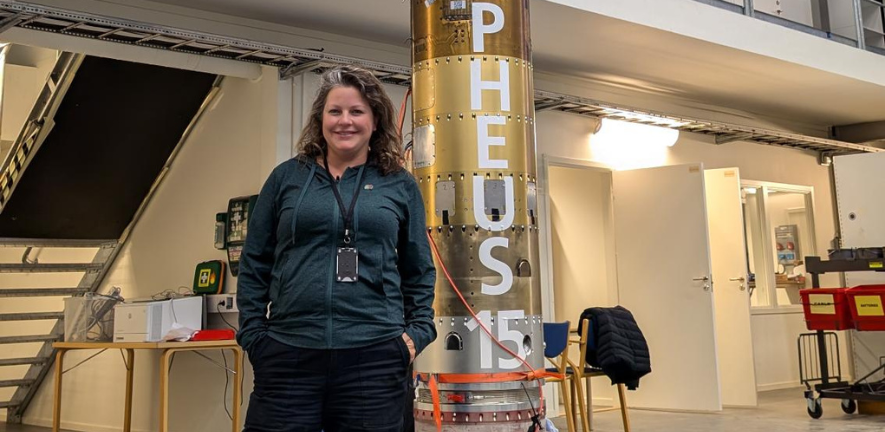
Submitted by Jane Durkin on Tue, 13/05/2025 - 15:45
Studying Plant Sciences at Cambridge can open up a wealth of career opportunities. In this series, we hear from Plant Sciences alumni about their experiences of studying here, how it shaped their careers and what they are doing now.
If you would like your alumni story featured, please email us at alumni@plantsci.cam.ac.uk.
About Jenny
Professor Jenny Mortimer completed her PhD in Plant Sciences at Downing College in 2008. Following her doctorate, she worked as a postdoctoral researcher in the Biochemistry Department at Cambridge, then undertook a fellowship at RIKEN in Japan.
In 2014, she established her research group at Lawrence Berkeley National Laboratory in the USA, before joining the University of Adelaide in 2021. Her research focuses on harnessing plant biochemistry to develop sustainable alternatives to fossil fuel-based fuels and materials, including plant-driven biomanufacturing for remote locations such as space.
What is your favourite memory from your time in the Department of Plant Sciences?
When I arrived, I was quite shy and initially found it very overwhelming to be surrounded by all these incredible scientists I knew only from reading their papers during my undergraduate studies. However, the Department was a welcoming environment, and I quickly felt at home. Many of my favourite memories are from the tearoom, sitting at the big tables and being encouraged to listen and join the lively scientific discussions. It didn’t hurt that beer hour was also held in the tearoom!
I also fondly remember the shared ‘ion transport’ group meetings, where Julia Davies’, Alex Webb’s and Mark Tester’s groups regularly gathered to present data. These meetings taught me early on the importance of critically thinking about experimental design and data analysis, and the value of receiving feedback from your ‘science family’ before taking results to a broader audience.
How did your time in the Department influence your career journey?
When I started my PhD, I wasn’t sure what career path I wanted to pursue. I knew I loved science, but had little understanding of what a scientific career could look like. My time at the Department of Plant Sciences gave me the confidence to take risks and showed me that the skills I was developing could be applied to a wide range of challenges.
The Department also instilled in me the importance of international collaboration and a community-minded approach to research. Despite its small size at the time, we had a steady stream of international visitors and a diverse cohort of staff and students working on a broad range of questions.
Although my first job after graduating was just across the road in the Biochemistry Department, my career has since taken me around the world. I still collaborate closely with current and former Department members today, including Alex Webb, Jen Bromley, Matt Gilliham, Stuart Roy, Mat Lewsey – and the list goes on!
What have you gone on to do since leaving the Department?
I am still working in academic plant sciences, much to my surprise and delight. After some really fun years as a postdoc with Paul Dupree (also a Plant Sciences alumnus) in the Biochemistry Department, and a short fellowship in Japan, I started my own research team in California at a US Department of Energy national lab. This experience gave me valuable insight into the research–industry–government interface, and many members of my former group are now scientists in biotech start-ups along the West Coast.
In 2021, I was fortunate to join the School of Agriculture, Food and Wine at the University of Adelaide (soon to become Adelaide University in 2026), a School with historic links to Cambridge’s Department of Plant Sciences. I am now Professor of Plant Synthetic Biology and Deputy Director of the Waite Research Institute.
My research focuses on using synthetic biology to develop novel crops for sustainable food and bioproduct production, as well as exploring the fundamentals of complex glycosylation in plants. This includes developing plants to support astronauts on long-term space missions as part of the Australian Research Council (ARC) Centre of Excellence for Plants for Space (P4S).
Our work will also help advance closed environment agriculture (CEA) and vertical farming. I am even part of a team developing a plant growth unit for NASA’s Artemis III mission, which aims to land humans (and plants!) on the lunar surface in 2027.
What do you enjoy most about what you are doing now?
I love that my job is so varied and allows me to keep learning and staying curious. Plants are fascinating organisms and there are still so many questions to explore! I also have the privilege of working with an incredible research group and an extensive network of collaborators across the globe.
To my immense surprise, thinking back to the shy student who first arrived in the Department of Plant Sciences twenty years ago, I also really enjoy teaching and public science communication. Plant science has a critical role to play in addressing major challenges such as climate change, population growth, and global supply chain disruptions. It is essential that we make research accessible to all – whether that’s talking about science in a primary school, a pub, or even in parliament – and I’ve done all three!
Image: Jenny Mortimer with the MAPHEUS 15 research rocket at Esrange Space Centre, Sweden, where she launched an experiment in November 2024 sending duckweed to the edge of space and back to measure gravity's impact for potential space food sources. The flight, facilitated by the German Aerospace Centre (DLR) and other international partners, offered valuable research time with an unprecedented seven minutes of weightlessness or microgravity.
